Are you or someone you know struggling with anxiety and stress? These conditions affect millions of people worldwide, causing a range of symptoms that can impact daily life. While there are various management techniques, a growing body of research suggests that diet plays a crucial role in alleviating anxiety symptoms.
Following a nutrient-dense diet rich in vegetables, fruits, and other healthy foods may help some people manage their anxiety symptoms. But what specific dietary components can make a difference?
Key Takeaways
- Discover how certain nutrients can impact mood regulation and alleviate anxiety symptoms.
- Learn about the connection between diet and mental health.
- Explore various food categories that can help ease anxiety, including omega-3 rich foods and probiotics.
- Get practical advice on incorporating anxiety-reducing foods into your daily meals.
- Create a sustainable eating plan for better mental health.
The Connection Between Diet and Mental Health
A growing body of evidence suggests that our diet can either exacerbate or alleviate symptoms of anxiety and depression. The relationship between what we eat and our mental wellbeing is complex, involving the bidirectional interaction between our nutritional intake and brain function.
How Nutrition Affects Anxiety Levels
Nutrition plays a critical role in our mental health, with certain dietary patterns capable of influencing our anxiety levels. Diets high in processed foods, sugar, and unhealthy fats can lead to increased inflammation and oxidative stress, potentially worsening anxiety symptoms. Conversely, a diet rich in whole foods, fruits, vegetables, and lean proteins can help mitigate these symptoms by providing essential nutrients and antioxidants.
Research on the gut-brain axis has shown that the microbiome influences mood regulation and stress response systems in the body. A balanced diet supports a healthy gut microbiome, which is crucial for producing neurotransmitters and regulating stress hormones.
Key Nutrients That Combat Stress
Certain nutrients have been identified as having a positive impact on mental health by reducing stress and anxiety. These include omega-3 fatty acids, magnesium, zinc, B vitamins, and antioxidants. Omega-3 fatty acids, found in fatty fish and some plant-based sources, support brain health and have been shown to reduce symptoms of depression. Magnesium and zinc play crucial roles in neurotransmitter function and synaptic plasticity. B vitamins are essential for synthesizing neurotransmitters, while antioxidants help reduce oxidative stress.
By understanding the connection between diet and mental health, we can make informed choices about our nutritional intake to support our mental wellbeing.
Omega-3 Rich Foods That Help Naturally Reduce Anxiety and Stress
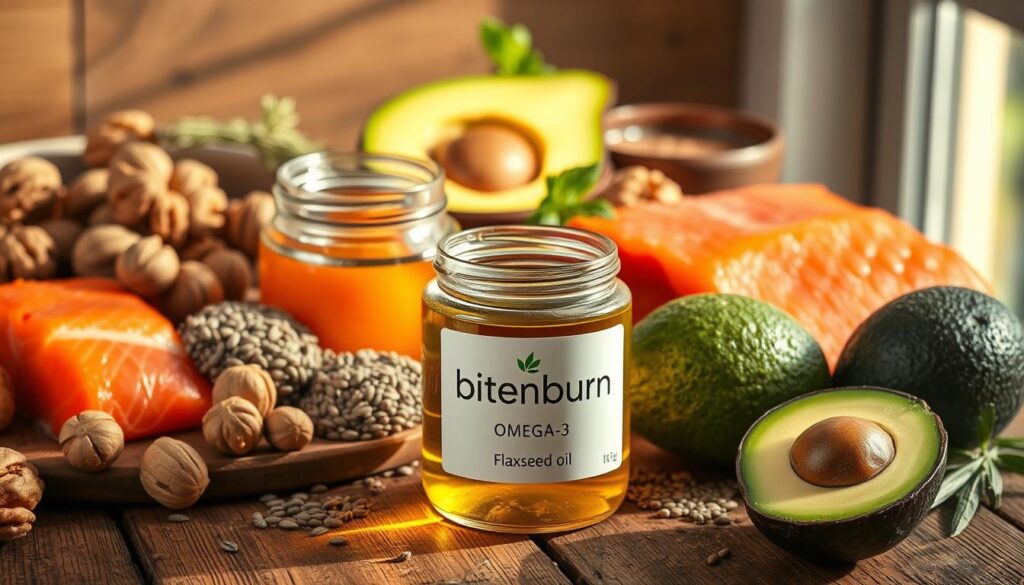
As we explore the relationship between diet and mental health, omega-3 rich foods emerge as a key component in anxiety reduction. Omega-3 fatty acids, particularly EPA and DHA, have been shown to play a crucial role in brain function and mental well-being.
Fatty Fish: Nature’s Anxiety Fighters
Fatty fish such as salmon, mackerel, sardines, trout, and herring are rich in omega-3s. These fish are considered nature’s anxiety fighters due to their high EPA and DHA content, which helps regulate neurotransmitters and reduce inflammation in the brain. Consuming at least two servings of fatty fish per week is currently recommended for optimal benefits.
Plant-Based Omega-3 Sources
For those who don’t consume fish, plant-based omega-3 sources are available. Flaxseeds, chia seeds, hemp seeds, and walnuts are rich in ALA, a type of omega-3 fatty acid. While ALA is not as directly effective as EPA and DHA, it can still contribute to overall omega-3 intake and support mental health.
How Omega-3s Work to Calm the Brain
Omega-3 fatty acids work to calm the brain by regulating neurotransmitters, reducing neuroinflammation, and promoting healthy brain function. Studies have shown that omega-3 supplementation can lead to reduced anxiety symptoms in clinical trials. The anti-inflammatory properties of omega-3s may also help reduce stress-related inflammation in the brain and body.
Protein-Packed Foods for Stress Relief
Protein-packed foods play a crucial role in stress relief by providing essential amino acids that support neurotransmitter production. Consuming adequate protein helps maintain healthy blood sugar levels, preventing energy crashes that can trigger anxiety.
Eggs: The Complete Protein Package
Eggs are an excellent source of protein and contain all the essential amino acids the body needs. They are also rich in tryptophan, an amino acid that helps create serotonin, a neurotransmitter that regulates mood, sleep, and behavior. Research suggests that serotonin can improve brain function and relieve anxiety.
Lean Meats and Their Calming Effects
Lean meats, such as beef, are loaded with protein and vitamin B12. Protein helps balance cortisol and blood sugar levels, while vitamin B12 provides an energy boost to ward off stress. Including lean meats in your diet can help minimize anxiety symptoms.
Plant Proteins That Ease Anxiety
For those following a plant-based diet, foods like legumes, tofu, tempeh, and quinoa are excellent protein sources. These foods help ease anxiety symptoms through their nutritional profiles, which support neurotransmitter production and overall mental health.
| Food | Protein Content | Anxiety Relief Benefits |
|---|---|---|
| Eggs | 6-7 grams per large egg | Rich in tryptophan, supporting serotonin production |
| Lean Beef | 22-26 grams per 3 oz serving | High in protein and vitamin B12, reducing stress |
| Quinoa | 8 grams per cup | Complete protein source, supporting overall mental health |
By incorporating these protein-rich foods into our diet, we can better manage stress and anxiety. It’s essential to maintain a balanced diet that includes a variety of protein sources to support optimal mental health.
“A diet rich in protein can help alleviate anxiety symptoms by supporting neurotransmitter production and maintaining healthy blood sugar levels.”
Magnesium-Rich Foods to Soothe Your Nervous System
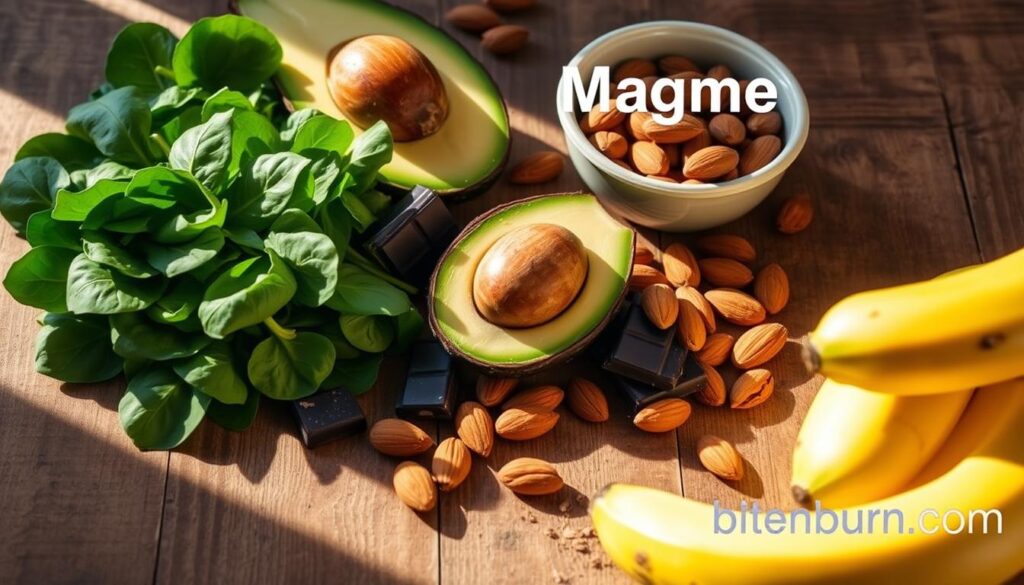
The nervous system relies heavily on magnesium to function properly, making it a crucial nutrient for anxiety management. Magnesium helps regulate neurotransmitters, reduce muscle tension, and support quality sleep, all of which are factors in managing anxiety.
Dark Chocolate: The Sweet Stress Reliever
Dark chocolate, particularly with 70% cacao or more, is not only a delicious treat but also a rich source of magnesium. It contains flavonoids that can improve mood and reduce stress hormones. The tryptophan in dark chocolate is converted into serotonin in the brain, further enhancing mood.
Nuts and Seeds for Natural Calm
Nuts and seeds are excellent sources of magnesium. Almonds, cashews, pumpkin seeds, and sunflower seeds are particularly beneficial. These foods also provide additional anxiety-reducing nutrients like vitamin E, potassium, and zinc, making them a great snack for stress relief.
Leafy Greens and Other Magnesium Sources
Leafy green vegetables such as spinach and Swiss chard are rich in magnesium and other stress-reducing nutrients. Other magnesium-rich foods include whole grains, legumes, and certain types of fish. Incorporating these into your diet can help ensure you’re getting enough magnesium to support your nervous system.
| Food | Magnesium Content (mg per serving) | Additional Benefits |
|---|---|---|
| Dark Chocolate (1 oz, 70% cacao) | 176 | Flavonoids, serotonin |
| Almonds (1 oz) | 80 | Vitamin E |
| Pumpkin Seeds (1 oz) | 156 | Potassium, zinc |
| Spinach (1 cup cooked) | 157 | Iron, antioxidants |
Probiotic Foods for Gut-Brain Health
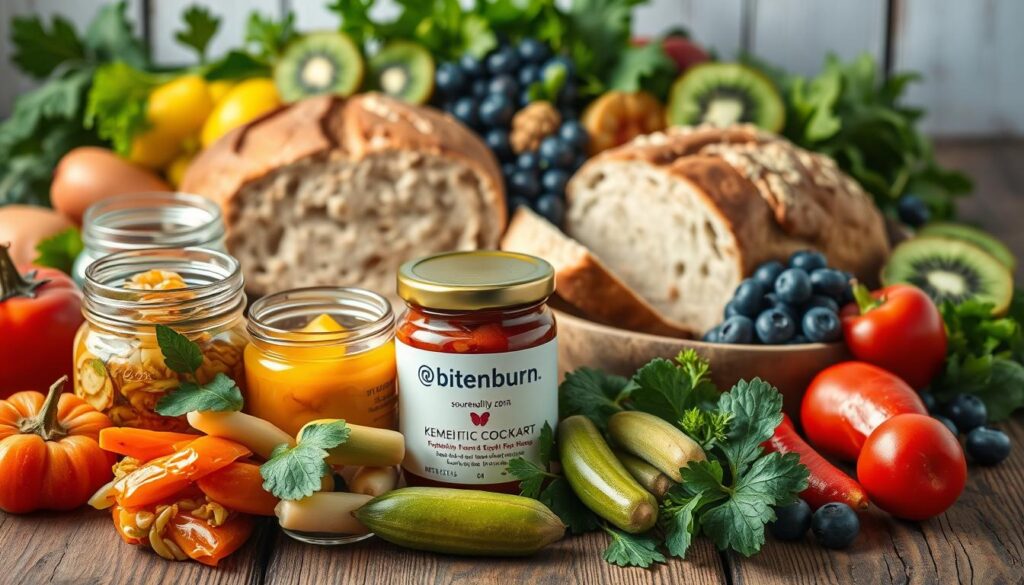
Emerging evidence highlights the crucial role of probiotics in maintaining a healthy gut-brain axis, potentially reducing anxiety and stress. The connection between our gut microbiome and brain function is complex, involving various pathways that influence our mood and mental health.
Yogurt and Fermented Foods
Yogurt is a well-known probiotic food, containing beneficial bacteria such as Lactobacillus and Bifidobacteria. These bacteria support gut health, which is linked to improved mental well-being. Other fermented foods like sauerkraut, kimchi, and kefir also offer probiotic benefits. Incorporating these foods into your diet can enhance your gut microbiome, potentially reducing anxiety.
The Gut-Brain Connection in Anxiety Management
The gut-brain axis is a bidirectional communication network between the central nervous system and the enteric nervous system of the gut. Research suggests that the gut microbiome influences brain function and behavior, with approximately 95% of serotonin (a key neurotransmitter regulating mood) produced in the gut. By consuming probiotic-rich foods, individuals may support a healthy gut-brain connection, potentially alleviating symptoms of depression and anxiety.
For more information on the gut-brain connection, you can visit Harvard Health Publishing, which provides insights into the benefits of probiotics for overall health.
Antioxidant-Rich Foods That Combat Stress
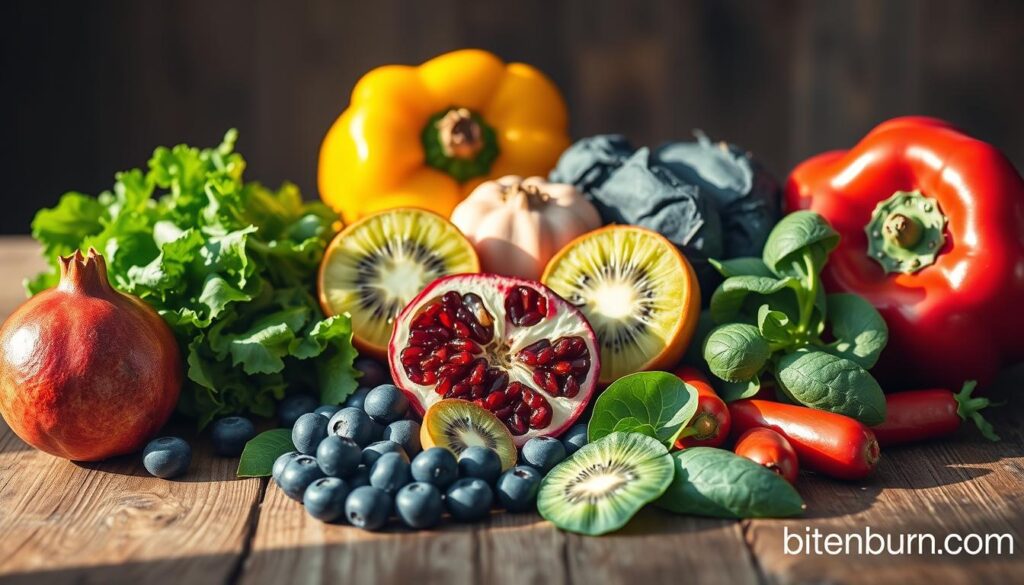
The power of antioxidant-rich foods lies in their ability to combat oxidative stress, a key contributor to anxiety. Oxidative stress occurs when there’s an imbalance between free radicals and antioxidants in the body, leading to cell damage and disrupted brain function. By consuming foods rich in antioxidants, we can neutralize these harmful free radicals and support mental wellness.
Berries: Small Fruits with Big Benefits
Berries such as blueberries, strawberries, blackberries, and raspberries are packed with vitamin C and antioxidants. These nutrients help regulate blood pressure and cortisol levels after experiencing high stress. The fiber in berries also supports gut health, which is linked to reduced anxiety.
Colorful Vegetables for Mental Wellness
Colorful vegetables provide a spectrum of antioxidants, with different color groups offering unique protective compounds. For example, leafy green vegetables are rich in folate, which helps produce neurotransmitters that regulate mood. Other vegetables like bell peppers and carrots are high in vitamin C and beta-carotene, respectively, contributing to overall mental wellness.
Herbs and Spices with Anxiety-Reducing Properties
Certain herbs and spices have been found to reduce anxiety. Turmeric, with its active ingredient curcumin, has anti-inflammatory and antioxidant properties that may lower anxiety by reducing oxidative stress. Other beneficial herbs and spices include saffron, oregano, and rosemary, each with unique mechanisms of action that support brain health.
| Food | Antioxidant Property | Benefit |
|---|---|---|
| Berries | High in Vitamin C and Antioxidants | Regulates blood pressure and cortisol levels |
| Turmeric | Contains Curcumin | Reduces inflammation and oxidative stress |
| Leafy Greens | Rich in Folate | Supports neurotransmitter production |
By incorporating these antioxidant-rich foods into our diet, we can take a proactive approach to managing stress and promoting mental wellness. Research has shown that antioxidant-rich diets are associated with lower rates of anxiety and depression, making them a valuable tool in our mental health toolkit.
Creating a Stress-Reducing Meal Plan
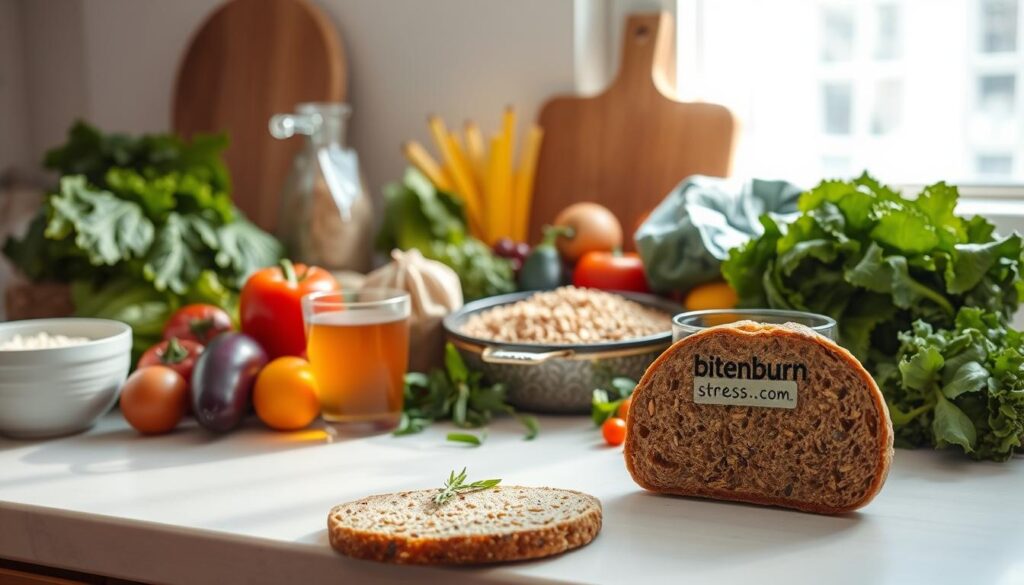
Developing a meal plan that incorporates anxiety-reducing foods can be a game-changer for managing stress. A well-structured meal plan helps in maintaining a balanced diet that includes high-quality, nutrient-dense carbohydrates, fats, and proteins.
To start your day calm, consider these Balanced Breakfast Ideas:
- Oatmeal with nuts and fruits
- Scrambled eggs with whole-grain toast
- Greek yogurt with berries and honey
Balanced Breakfast Ideas to Start Your Day Calm
Begin with breakfast options that combine protein, complex carbohydrates, and healthy fats. This balance helps stabilize blood sugar and mood from the start of the day.
Stress-Fighting Lunch and Dinner Options
For lunch and dinner, incorporate multiple anxiety-reducing ingredients. Examples include grilled fish with quinoa and vegetables, lean meats with brown rice and steamed vegetables, and plant-based meals rich in omega-3 fatty acids and fiber.
Snacks That Keep Anxiety at Bay
Choose snacks that maintain steady energy levels and provide mood-regulating nutrients. Examples include nuts and seeds, fruits, and dark chocolate.
| Meal | Anxiety-Reducing Foods | Benefits |
|---|---|---|
| Breakfast | Oatmeal, nuts, fruits | Stabilizes blood sugar and mood |
| Lunch/Dinner | Grilled fish, quinoa, vegetables | Reduces inflammation and anxiety |
| Snacks | Nuts, seeds, dark chocolate | Maintains energy and regulates mood |
By incorporating these foods into your meal plan and practicing mindful eating, you can enhance the stress-reducing benefits of your diet.
Conclusion: Nourishing Your Way to Calm
As we conclude our exploration of foods that help naturally reduce anxiety and stress, it’s clear that diet plays a crucial role in mental health. The connection between what we eat and how we feel is undeniable, and certain nutrients can significantly impact our mood and overall wellbeing.
Key Findings and Recommendations
We’ve identified several food groups that can help alleviate anxiety and stress, including omega-3 rich foods, protein-packed foods, magnesium-rich foods, probiotic foods, and antioxidant-rich foods. Incorporating these into your diet can make a significant difference in managing symptoms of anxiety and depression.
It’s essential to remember that while dietary changes are crucial, they are most effective as part of a comprehensive approach that includes therapy, medication (when necessary), exercise, and stress management techniques. Consistency is key; maintaining a healthy eating pattern over time yields better results than occasional consumption of anxiety-reducing foods.
Empowering Change
We encourage you to start with small, sustainable changes, paying attention to your unique reactions to different foods. As you make progress, you’ll find that managing anxiety becomes easier, and making healthy food choices becomes a natural part of your daily routine. By taking control of your diet and mental health, you’re taking a significant step towards a healthier, happier you.


[…] mental health? Surprisingly, over 43 million Americans experience a mental illness every year, with anxiety and major depressive disorder being the most common. Yet, many don’t realize that their […]
[…] for centuries, and modern science is now uncovering its incredible health benefits. From reducing anxiety to improving heart health, green tea offers more than just a refreshing […]
[…] Mindfulness is about being centered in the present moment, allowing you to tackle challenges with clarity and composure. As you explore the benefits of mindfulness, you’ll discover how it can transform your workday, improving your focus and reducing stress. […]
[…] practical, combining simple lifestyle adjustments with targeted natural solutions can significantly reduce discomfort. From nasal irrigation techniques to immune-boosting dietary changes, you’ll discover […]
[…] a large 2011 study, 15 minutes of moderate exercise daily was linked to longer life expectancy and reduced risk of mortality. We can all spare 15 minutes a day to invest in our health. Our busy lives often make […]
[…] research confirms meditation reduces stress instantly for most […]
[…] shields cells from damage and strengthens white blood cells. Research shows regular intake reduces cold duration by […]